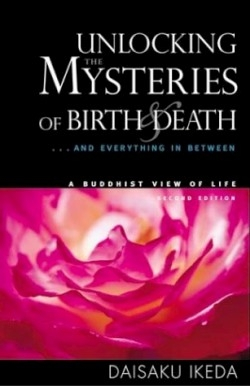Unlocking the Mysteries of Birth and Death and Everything in Between
A Buddhist View of Life
The cause of unhappiness, according to Buddhism, “is not just that we have problems but that we lack the power and wisdom to solve them.” As evidenced by its ambitious title, this book endeavors to show the reader how to do just that.
The book begins by outlining the basic experiences of life that cause biological, physiological, and psychological suffering: birth, aging, sickness, and death. Shakyamuni, the first historically recognized Buddha, dedicated himself for many years to the study of various religious practices in order to attain enlightenment and thus gain freedom from these sufferings. While his path was ultimately successful, it was extremely difficult for anyone other than the most committed monks and nuns to achieve. Other approaches were undertaken over the years, to varying degrees of realization, until the arrival of the thirteenth-century Japanese priest Nichiren.
The philosophy of Nichiren was based on the final teaching of Shakyamuni, which essentially stated that all living beings are capable of attaining enlightenment through the recognition of the inseparable nature of the relationship between man and his environment. The fully developed balance of the internal and external will transform not only the individual, but the world in which he lives. The author explains how the concepts of Nichiren Buddhism can be applicable and beneficial to modern lives in such matters as parenting, environmental issues, medicine, and death with dignity. The ideas of such Western thinkers as Alan Watts, Gregor Mendel, Elisabeth Kubler-Ross and Norman Cousins are considered, along with the musings of ancient Buddhist philosophers.
The author is a Buddhist thinker, educator, and author of dozens of books, as well as serving for decades as the head of Soka Gakkai International, a Buddhist association existing to promote world peace, culture, education, and individual happiness through the teachings of the Nichiren school of Buddhism. He has received honorary degrees from twenty universities along with several prestigious awards, including the United Nations Peace Award. In this slender volume, Ikeda presents a wealth of profound information in a clear and straightforward style that can be easily absorbed by the interested lay reader.
His life’s work, and the underlying purpose of this book, is simply to help human beings to derive the maximum meaning from their lives through the study of Buddhism. With this accomplished, individuals will fulfill their ultimate potential, leading to happier families, more productive workplaces, and peaceful, prosperous societies.
Reviewed by
Dan Bogey
Disclosure: This article is not an endorsement, but a review. The publisher of this book provided free copies of the book to have their book reviewed by a professional reviewer. No fee was paid by the publisher for this review. Foreword Reviews only recommends books that we love. Foreword Magazine, Inc. is disclosing this in accordance with the Federal Trade Commission’s 16 CFR, Part 255.

